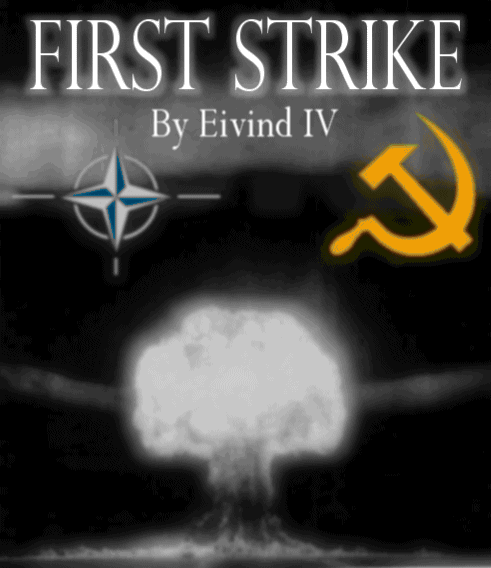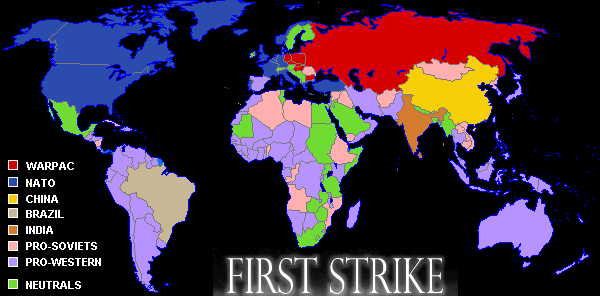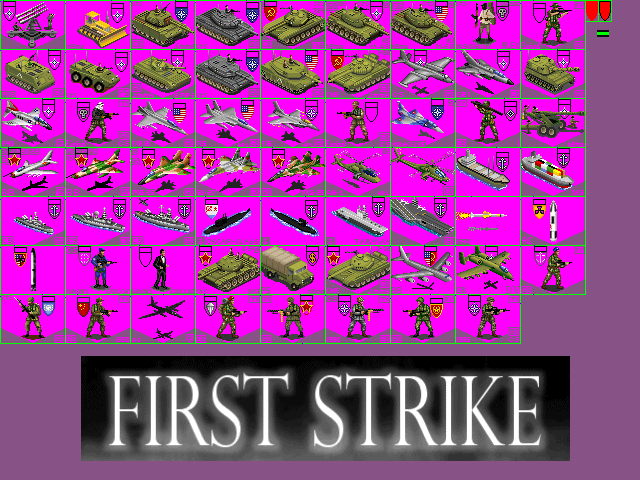First Strike
Description
First Strike
First Strike 2
In the time after the second world war the victorious allies of the West and the Soviet Union respectively, grew growingly suspicious of each others' world ambitions. This in essence led to a state of 'cold war' between the former allies, resulting in an arms race like never before, involving not only conventional weapons but also nuclear weapons. From this constant state of war readiness, the world became a stage of an ideological battle between capitalism and communism, using means such as economic warfare and trade embargoes, propaganda, xenophobia, espionage and proxy wars. The threat of mutual assured nuclear destruction made sure that no one would dear to deliver the first strike, as both sides had enough nuclear weapons to bomb each other out of existence and to make the entire planet uninhabitable. But as technology became more advanced, granting better accuracy of the delivery systems, the doctrine of first strike was developed, to degrade the enemy's nuclear forces to such an extent that the retaliatory response would involve "acceptable" losses. The possibility of a first strike weakened the peace based on the deterrence theory, and hence increased the tensions of a third world war.
The time is 1975, where the current world tensions is at an ease, but with developing world events, and one of the superpowers in your hands, this may very well change. Will you be able to deliver the First Strike?
The time: 1975-1989 The objective: Win the Cold War, in one way or the other.
Screenshots
Civilizations
Playable Civs:
1. Warsaw Pact 2. People's Republic of China 3. NATO 4. Brazil 5. India
AI Civs:
6. Pro-Westerners 7. Pro-Soviets 8. Non-Aligned (Barbarians)
House Rules
Generic house rules:
01. No tech trading. 02. No reloading! 03. No terraforming. 04. No rehoming of trade units. 05. No 'square stealing' from the AI. 06. No air protected land/sea stacks. 07. No "freezing" of airplanes. 08. No ship chains. 09. No building of new cities. Only re-creating razed ones alowed. 10. No airbases in adjecent to each other or a city. 11. No artificial creating of ZOC with units.
Scenario specific house rules:
12. No bribing of cities or units (Spain may be bribed in 1981 by NATO). 13. No bribing of other than the AI pro-countries allowed. Nor may Non-aligned be bribed. A state of war between human civs is the exeption. 14. No trading of NATO with the pro-soviets, and vica verca WARPAC may not trade with the Pro-Westerners. Everyone may trade with the Non-Aligned. China/Brazil/India may trade freely world wide. 15. No war ships may cross straits owned by a foreign power (i.e. the Bosphorus Strait (Istanbul), Suez Canal, Panama Canal, Kiel Canal, Gibraltar strait, Øresund (Copenhagen) etc.). 16. NATO can only build it's USA units in America and likewise it's European in Europe. 17. No use of missiles in a proxy war. 18. NATO and WARPAC may station 2 units of their choosing in any of their pro-country (read "How a proxy war is won" in the Proxy * War section).
Unit house rules:
19. No Jet bombers and Long Range Bombers on Carriers. 20. No more than 5 units on the regular Aircraft Carrier and maximum 15 on the NP supercarrier. 21. No ICBMs on Aircraft Carriers. 22. No ballistic missiles on submarines until you've researched "Submarine-Based Nukes". And subs may not carry ICBMs, only MRBMs and Cruise Missiles. 23. Once discovered "Submarine-Based Nukes", you may only have 1 MRBM in a sub, or only 4 cruise missiles. You can't combine them * in one sub (remember that missiles must be loaded inside a city). 24. No "flying" of missiles from sub to sub, carrier to carrier, or city to ship. Missiles must be loaded inside a coastal city. 25. No using of missiles for reconaissance. For that you use aircrafts, and then especially the recon aircraft. 26. Only the recon aircraft may do aerial incursions into enemy territory during recon missions.
Diplomatic house rules:
27. Every civ may sneak attack, but only with conventional weapons. Nuclear weapons may first be used on the second war turn. 28. WARPAC can not declare war on the pro Soviet civ and vice verca NATO may not declare war on the pro Western civ.
Victory Point System
In Multiplayer this scenario is won by a system of victory points. This to avoid a certain nuclear holocaust, and to make the scenario more of a struggle to keep the peace than to be the first one to start WW3.
The civ with the most victory points upon ended game wins. Score is to be kept in full honesty between the players during the game, with updates on the respective players' point situation after each played turn. Everyone start at zero points.
Diplomacy points
-50 points for declaring war without a legitimate casus belli. -25 for provoking the other civ to declare war.
Civilised points
+0,5 point for every trade route established for WARPAC and NATO. China, Brazil and India gets +1 (zero points for trading with your own civ). -1 point for every pollution square within you territory. In case of a nuclear attack the attacker get's -1 point for every pollution square created in enemy territory (points given back upon cleaning).
Technological points
+2 point for every civil tech discovered. -2 point for every military tech discovered. -5 points received for every ICBM built after having discovered Tsjernobyl Lesson.
War points
-10 points for every nuke used (minus points for caused pollution in adition). +2 points for every city won through proxy war. +1 point for capturing a human city using conventional weapons. -5 point for capturing a human city using nuclear weapons. +10 points for capturing an enemy capitol city (points lost upon enemy recapture). -10 points for losing capitol city (points won back upon recapture).
Proxy Wars using the shield system
How to start a proxy war
Proxy Wars are started using Dario's Diplomacy tool (rember to save from both civ sides). You force war, and before you save your turn force peace, so that the AI won't attack you from another pro-country independent of the proxy war you're fighting. If a player decides to start a proxy war, he must announce this 3 turns before he sends his units from his home ports. This gives the opposing side time enough to scramble troops for a counter move to the same country.
What you may bring
A player may only bring with him x100 (planes count x200 (including helicopters), ships nothing) worth of units in terms of shields of what the actual city size is. If a proxy war is started in a size 5 city, the player is allowed to bring with him 500 shields worth of units. Whole countries are represented, so if the country has more than one city, the city sizes are added together as one city size to determine how many shields may be brought along. If you lose units in the fight you may send in aditional reserve forces. You can send unlimited units into the territory, as long as you stay within the shield limit.
How a proxy war is won and what you do afterwards
A player may claim victory in two cases
1. Annihilate the enemy force. 2. Capture and hold all cities for 5 turns.
After winning the war, the nation must be handed back to the respective minor ally. After this a new proxy war can't be started for another 6 (1 game year) turns by the opposing side, so that remote participants in a future proxy war can prepare for the next assault. Once handed over the player may start to trade with the city. The victor of the proxy war may station 2 units, including planes (in which case he may build an airbase within the country's border), of his chosing in the country after having won the war. These units would then be alowed to be used in adition to a possible new proxy war in that country. If a city is captured, you may not build anything in it, only city improvements.
What countries you may attack
In general all "Pro-" countries are subject to proxy wars (exept Cuba and Chile), but for the mentioned on the excluded list the player get a legitimate chance to declare war on the opposing side, without loss of victory points (VP). In this situation it will be regarded as a provocation by the opposing side and he will suffer -25 VPs in accordance to VP rule #2.
What China/India/Brazil may do
China, India and Brazil may keep the cities they start proxy war in. But those areas are of course then again subject to counter proxy wars from both the Soviets and the NATO. But they as well should be careful starting proxy wars with nations on the exeption list...
Hints
Proxy Wars
As capitalist civs can only trade with capitalist civs, and WARPAC only with the Pro-Soviets (Everyone can trade with the Non-aligned), proxy wars will be important. To simulate proxy wars (especially in MP games) you will have to ship military hardware to a pro-the opposite of your pro civ's city and unload them nearby. Then you must gift these units to your pro-civ AI, and hope they can win the war and swear legiance to you. This is the only way to expand markets, as you can not declare war just like that without triggering WW3. Once this is done you can ship trade goods to the city and benefit from the revenues. In the case of an MP game, obviously not all pro cities are cities the other human's would tolerate as your new pro city, so be aware. Africa and South America are declared "free zones", meaning everyone can start proxy wars there without the fear of military reactions from the other human civs.
Avoid global warming
Co-operate with other nations to keep down the growing pollution around the world. Invest in environmentally friendly technology and city improvements. Only in this way can you avoid global warming.
Russian industries
As Russia controls the Caucasus Oil wonder (Hoover Dam) from the start, every city which builds a Heavy Industry will immediately get a +100% shield production.


